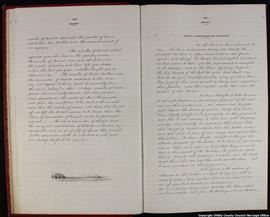Annual report for year ending June 1860 containing details of the leaseholder's compensation fund, the executors' arrears, mesne rates, new rentals and the purchase of leases. Also discusses estate improvements: permanent land improvement at Meelaghans; the creation of turf banks at Colehill; management of woods and plantations at Scrubb Wood, Killeenmore and Derryweelan ('Furry Hill'); and the building of roads and bridges at Clonad and Derryclure. Particularly refers to the 'model farm' which has been established at Ballyknockan.
In relation to the construction of houses, the report describes the completion of Richard Odlum's offices in Ballyduff, 'one of the most independent and thriving farmers on a large scale on the estate.' Also discusses Odlum's house in Ballymooney to be near completion. Reports that cottages in Killeigh and the new rent offices are complete 'and ought to last forever'. Referring to dire housing conditions amongst some of the tenantry, the report justifies the expense on rebuilding houses and states that there was more than one case on the estate 'where the inhabitants were in daily danger of being buried alive.' Also reports on small repairs to existing tenants' houses and a scheme of compensation for 59 families to surrender certain tenancies.
Also reports on agrarian unrest and agitation by Ribbonmen on the estate, including arson attacks on Geashill Castle offices and outhouses, and an arson attack on the farm of Mrs. Pattison, Protestant tenant at Annagharvey. Appendix contains copy letter from John Townsend Trench, second son of W. S. Trench, who interviewed Mary Shea, barmaid of the Cross Keys public house, Geashill, at the barracks in Tullamore where she was being held for her own safety. Letter describes plot to assassinate T. W. Trench and lists the main Ribbonmen active in Geashill as told to J. T. Trench: Loughlin Kelly ('treasurer of the murder fund'), Henry Bryan of Cross Keys public house; John Whelaghan, John Helian, William Grumly, Ned Geraghty, Christopher Mooney, Johnny Clibborn and others.
Drawing on pg 151:
Sign language or secret signals of the Ribbonmen

